
Egg marketing is always important, and is perhaps even more important now, as new recommendations related to eggs have surfaced and the coronavirus (COVID-19) pandemic continues to create havoc for some.
In her new role as president and CEO of the American Egg Board (AEB), Emily Metz will lead the AEB staff and will collaborate with the American egg industry to build demand for U.S. eggs and egg products domestically and abroad.

Emily Metz is the president and CEO of the American Egg Board. (Len Spoden)
She recently spoke about the importance of the new report from the Dietary Guidelines Advisory Committee (DGAC).
"On July 15, for the first time in history, the DGAC in its scientific report issued recommendations for infants from birth to 24 months. Importantly, that report specifically recommended eggs as a first food for infants and as an important food for expecting and new moms, as well as for growing children — due largely to their choline content," Metz said.
The AEB has focused a lot of its academic research around choline through its nutrition science group, the Egg Nutrition Center.
"We've been working hard to educate health professionals and the general public on the importance of choline," she said.
With the new recommendations, the AEB plans to make sure a variety of audiences, including consumers, health professionals and media, are aware of the news.
"Our efforts to date have generated more than 800 million media impressions — a staggering number. We've also created a toolkit with infographics and other assets for our producers and state organizations to amplify the incredible news," Metz said.
“The DGAC's recommendations will continue to factor prominently in our marketing efforts near- and long term, and we'll be working to have eggs make the rounds on top network programming and lifestyle print media in the weeks and months ahead to build on this monumental opportunity for eggs in the American diet," she said.
New social marketing campaign
The AEB introduced a new social marketing campaign in July called #WEGGSDAY. The idea behind the campaign is to increase usage and consumption of eggs midweek among current egg consumers.
"As a commodity staple in more than 94% of U.S. refrigerators, there isn't much room for growth in consumer penetration. In other words, we're probably not going to convert that small percentage of consumers who aren't already eating eggs, so we have to pursue growth by selling more product, more often to our existing customer base," she said.
Research done by the AEB unveiled key opportunities where eggs could provide a solution for meal occasions where eggs are not currently taken advantage of.
"Specifically, what to make for weeknight dinners is a perennial consumer dilemma," said Metz.
COVID-19 only amplifies these opportunities as consumers find themselves at home preparing most of their meals seven days a week. While eggs have traditionally been a part of breakfast, the pandemic opens the door to include them in lunch, dinner and snacks.
"The problem, our research showed, was that eggs are so deeply ingrained in the consumer's mind as a breakfast food that when they open the refrigerator looking for ideas for lunch and dinner, their carton of eggs is practically invisible," Metz said.
With research results in mind, she said that the AEB set out to accomplish two goals. These included repositioning The Incredible Egg in the consumer's mind as a protein option for each meal and snacks and to remind consumers that more than likely they already have eggs in the refrigerator to solve their "what to make" predicament.
"One solution: Create a day of the week dedicated to eggs all day — for breakfast, lunch, dinner and snacks. Thus, Wednesday is now Weggsday. Similar to Taco Tuesday, this consumer social marketing program is designed to drive usage and consumption in more meal occasions by making eggs top of mind during the midweek slump and providing the inspiration — recipe and otherwise — needed to solve the consumer's problem," she said.

#Weggsday is on social media platforms with a cast of egg characters that sing and dance their way through a music video to convince consumers to eat eggs in meals throughout the entire day. (Courtesy AEB)
#Weggsday is on top social platforms with a cast of egg characters that sing and dance their way through a music video honoring eggs all day. Every Wednesday through mid-November, The Incredible Egg will deliver creative messages from the Weggsday video, alongside food ideas across all meal day parts.
Supporting foodservice during COVID-19
Restaurants across the country have been devastated by the COVID-19 pandemic, and sales of eggs and egg products to those businesses have been dramatically affected.
"Eggs have been tremendously popular with consumers during COVID-19, and egg sales at retail have been booming, but the other side of our business has been struggling," Metz said.
Approximately 35% of the nation's restaurants are closed and many may be closed forever.
"We, as America's egg industry, must continue to be a trusted partner to the foodservice industry. Last month, the AEB rolled out a foodservice recovery program designed to help drive traffic back to restaurants by capitalizing on the off-premise dining opportunity, leveraging the egg's versatility, functional benefits, nutritional profile and incredible popularity with consumers. The program encompasses a three-pronged approach, with enhanced partnership support for large chains; resources and tools to take advantage of drive-through and carryout opportunities; and a new ‘Boosting Breakfast Business’ program for smaller operators," she said.
The AEB has met with national partner accounts in foodservice to present consumer research and promotional concept designs. It is also leveraging the Weggsday campaign with several large partner chains.
The AEB also introduced a support program specifically for smaller operators that features a combination of tools covering how to make, menu and market meals featuring eggs.

Smaller restaurant operators can benefit from a mixture of tools provided from the AEB that cover how to make, menu and market meals with eggs. (Courtesy AEB)
"Looking ahead, the pandemic will still factor into consumer behavior, but people are going to have to find ways to live with COVID. Our consumer research found people plan to eventually return to their pre-COVID breakfast away-from-home eating habits, after a transition period that may take several months. One particularly encouraging item from the research is that younger consumers are significantly more likely to get breakfast and brunch out than they were pre-pandemic. So, we're optimistic about our future in foodservice, and we're working hard with our partners to get eggs and egg products flowing back into America's restaurants. We're looking for big ideas so that the egg industry can continue to be a trusted partner to the foodservice industry, especially now," she said.

















